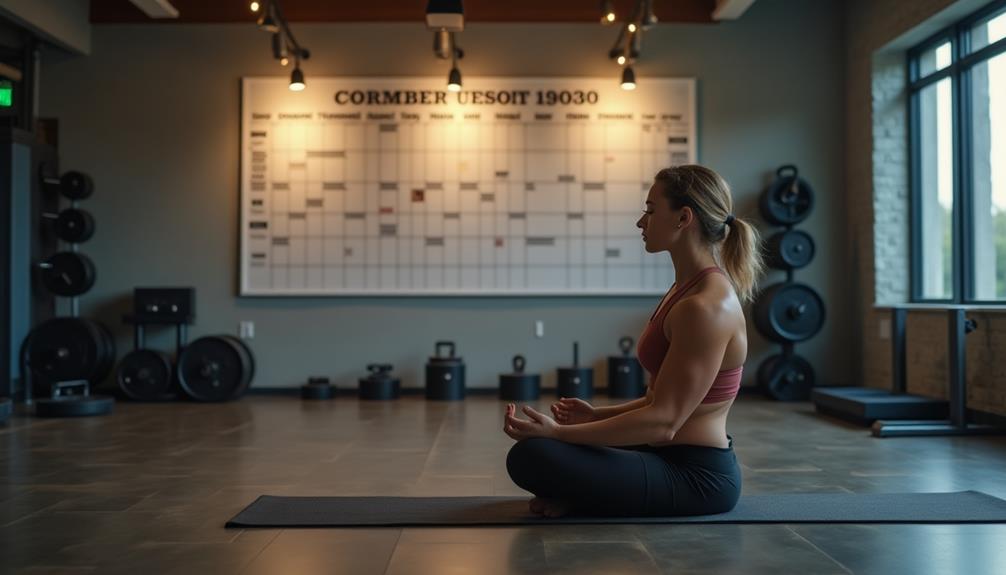To enhance recovery as a bodybuilder, start with these essential tips. Prioritize Sleep; it's crucial for muscle repair. Stay Hydrated by drinking water consistently throughout the day. Incorporate Stretching before and after workouts to improve flexibility. Engage in Low-Intensity Cardio on rest days for improved blood circulation. Utilize Foam Rolling to reduce soreness and promote relaxation. Focus on Nutrition; consume protein and carbohydrates right after your workout for optimal recovery. Finally, don't forget to Schedule Recovery Days to let your body recuperate. Each of these practices will significantly enhance your recovery game and help you perform at your best.
Core Insights
- Prioritize sleep by establishing a consistent bedtime routine to enhance recovery and performance.
- Stay hydrated throughout the day to maintain strength and avoid fatigue; consider natural electrolyte sources.
- Incorporate dynamic stretching before workouts and static stretching after to improve flexibility and reduce soreness.
- Engage in 20-30 minutes of low-intensity cardio on rest days to aid muscle recovery and enhance overall fitness.
- Utilize foam rolling regularly to target tight muscle areas, reduce soreness, and promote relaxation.
Prioritize Sleep

Prioritizing sleep is vital for bodybuilders aiming to maximize recovery and performance. Sleep plays an optimal role in muscle repair, hormone regulation, and overall well-being. When you skimp on sleep, you hinder your body's ability to recover properly, which can lead to decreased strength and increased fatigue. For best rest and rejuvenation, consider using sleep and recovery aids that contain ingredients like melatonin or natural herbs to support your sleep cycle.
To improve your sleep quality, establish a consistent bedtime routine. Aim for seven to nine hours of sleep each night. Create a sleep-friendly environment by keeping your room dark, cool, and quiet. Limit screen time before bed, as blue light can interfere with your natural sleep cycle. Additionally, consider incorporating relaxation techniques, such as deep breathing or meditation, to help calm your mind. By prioritizing sleep, you'll set yourself up for better workouts and faster recovery.
Stay Hydrated

Staying hydrated is necessary for bodybuilders looking to enhance their performance and recovery. Water plays a vital role in nutrient transport, temperature regulation, and joint lubrication. When you're dehydrated, your muscles can't function at their best, leading to fatigue and decreased strength. For ideal hydration, consider incorporating coconut water brands into your daily routine, as they offer natural electrolytes and minerals that can aid in recovery.
Aim to drink water consistently throughout the day, not just during workouts. Keep a water bottle handy and sip regularly. A good rule of thumb is to drink at least half your body weight in ounces daily. After intense training sessions, consider replenishing electrolytes to help restore balance.
Monitor your hydration levels by paying attention to your urine color. Light yellow indicates good hydration, while darker shades signal a need to hydrate more. Prioritize your water intake for improved recovery and performance.
Incorporate Stretching

Incorporating stretching into your routine can greatly enhance your recovery and overall performance as a bodybuilder. Stretching helps improve flexibility, which is essential for achieving a full range of motion during exercises. It also aids in reducing muscle soreness and stiffness after intense workouts. For added benefits, consider using compression sleeves on specific muscle groups to further support recovery and enhance performance during stretching sessions.
To get started, set aside time for both dynamic stretching before your workouts and static stretching afterward. Dynamic stretches warm up your muscles, preparing them for action. Static stretches, held for 15-30 seconds, promote relaxation and help lengthen tight muscles post-training.
Aim to stretch major muscle groups, focusing on areas that feel tight. Consistency is key; try to stretch at least three times a week. Your body will thank you, and your performance will likely improve.
Engage in Low-Intensity Cardio

While stretching lays a solid foundation for recovery, engaging in low-intensity cardio can further enhance your muscle recovery and overall fitness. This type of cardio, such as brisk walking, cycling, or swimming, keeps your heart rate elevated without putting excessive strain on your muscles. Aim for sessions lasting 20 to 30 minutes, ideally on your rest days.
Low-intensity cardio improves blood circulation, delivering essential nutrients to your muscles. This aids in the removal of waste products like lactic acid, promoting faster recovery. Additionally, it helps maintain your cardiovascular fitness without compromising muscle gains. Remember, the goal is to keep it light and enjoyable, allowing your body to recover while keeping you active. Incorporate this into your routine, and you'll notice the benefits.
Utilize Foam Rolling

Foam rolling is a game-changer for muscle recovery, and just a few minutes can make a significant difference. This simple tool helps release muscle tightness and improves blood flow, speeding up your recovery process. Incorporating foam rolling into your routine can provide numerous benefits.
- It reduces muscle soreness after intense workouts.
- It enhances flexibility and range of motion.
- It targets specific muscle groups with precision.
- It promotes relaxation and reduces stress.
To get started, roll slowly over tight areas, focusing on tender spots. Spend about 1-2 minutes on each muscle group, and don't forget to breathe deeply. By making foam rolling a regular practice, you can support your body's recovery and enhance your overall performance.
Focus on Nutrition

After you've rolled out those tight muscles, it's time to turn your attention to nutrition. Fueling your body properly is essential for recovery. Focus on consuming protein-rich foods, as they help repair and build muscle tissue. Aim for lean meats, fish, eggs, or plant-based options like legumes and tofu.
Don't forget carbohydrates! They replenish glycogen stores depleted during your workouts. Whole grains, fruits, and vegetables are excellent choices.
Hydration is vital, too. Drinking enough water supports every bodily function, including recovery. Consider adding electrolytes after intense sessions.
Lastly, timing matters. Eating a balanced meal or snack within 30 minutes post-workout can maximize your recovery. Prioritize these nutrition tips to keep your body primed for your next training session.
Schedule Recovery Days

Consider these tips when planning your recovery days:
- Plan ahead: Mark them on your calendar to guarantee you're sticking to your recovery schedule.
- Active rest: Engage in low-intensity activities like walking or swimming to keep blood flowing.
- Listen to your body: If you're feeling particularly fatigued, extend your recovery time.
- Stay hydrated: Proper hydration aids in recovery and helps maintain your energy levels.
Frequently Asked Questions
How Does Stress Affect Recovery for Bodybuilders?
Stress negatively impacts your recovery by increasing cortisol levels, which can hinder muscle repair and growth. You might find your energy levels drop, making it harder to stay motivated and perform effectively during workouts.
What Role Does Mental Recovery Play in Bodybuilding?
Mental recovery is essential for you in bodybuilding. It helps you stay focused, reduces anxiety, and boosts motivation. By prioritizing mental rest, you enhance your performance and overall well-being, making your training more effective and enjoyable.
Can Supplements Aid in Active Recovery?
Imagine your body as a garden; supplements can act like nourishing rain, helping your muscles recover and bloom. They're not a magic fix, but they can support your efforts when combined with rest and proper nutrition.
How Often Should I Change My Recovery Routine?
You should change your recovery routine every 4 to 6 weeks. This keeps your body challenged and prevents plateaus. Listen to your body, and adjust your routine based on how you feel during recovery.
Are There Specific Recovery Techniques for Older Bodybuilders?
Imagine an oak tree, strong yet wise with age. For older bodybuilders, prioritize gentle stretches, low-impact cardio, and mobility work. These techniques help you maintain strength and flexibility, ensuring your body thrives for years to come.

